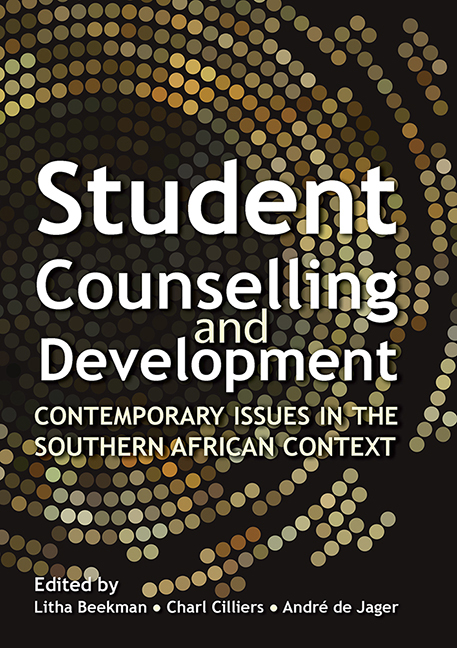 Student Counseling and Development in the South African Context
Student Counseling and Development in the South African Context Book contents
- Frontmatter
- Contents
- Figures
- Tables
- Preface
- Section 1 Development of Student Counselling and Development in Southern Africa
- Section 2 Theoretical Foundations of Student Counselling and Development in Higher Education
- Section 3 Services and Programmes Provided by Student Counselling and Development Units
- Section 4 Student Counselling and Development For Special Groups
- Section 5 Quality Assurance and Ethical and Professional Issues
- Contributors
- Index
Section 5 - Quality Assurance and Ethical and Professional Issues
Published online by Cambridge University Press: 22 February 2020
- Frontmatter
- Contents
- Figures
- Tables
- Preface
- Section 1 Development of Student Counselling and Development in Southern Africa
- Section 2 Theoretical Foundations of Student Counselling and Development in Higher Education
- Section 3 Services and Programmes Provided by Student Counselling and Development Units
- Section 4 Student Counselling and Development For Special Groups
- Section 5 Quality Assurance and Ethical and Professional Issues
- Contributors
- Index
Summary
This last section consists of two chapters.
Chapter 16 briefly outlines two pivotal components of quality assurance within the context of Student Counselling and Development (SCD) services, namely, impact and cost effectiveness studies. This is done by referring to five main sub-sections:
• The need for and relevance of quality assessments;
• The major underpinning factors;
• Contemporary terminology;
• A tentative framework of principles;
• Practical strategies, guidelines and suggestions.
Chapter 17 provides information and guidelines with regard to ethical and professional issues in the counselling and development of students in higher education (HE). Major ethical issues, such as professional competence, confidentiality, informed consent, sexual misconduct, boundaries, power, record-keeping and protection from impairment are discussed. The chapter proceeds to discuss specific issues, such as psychological and psychometric testing, handling HIV/AIDS and termination of pregnancy, as well as telephonic and online counselling. Attention is also given to the management of supervision and peer helpers as well as assisting disabled students. The chapter concludes with a discussion on the resources available to student counsellors, such as literature, codes of ethics, legislature and support networks.
- Type
- Chapter
- Information
- Student Counseling and Development in the South African ContextContemporary issuesin the Southern African Context, pp. 287 - 288Publisher: University of South AfricaPrint publication year: 2012
